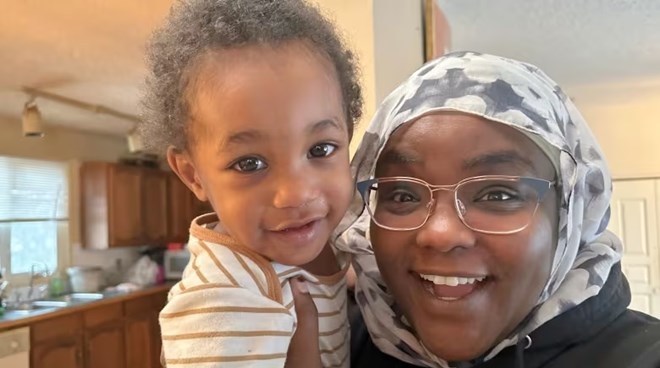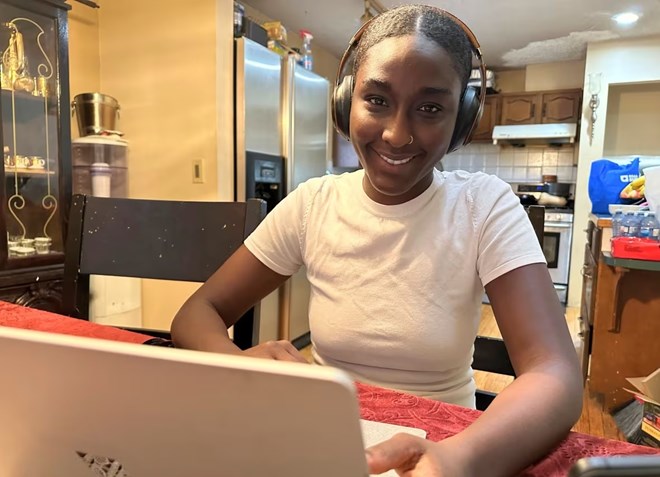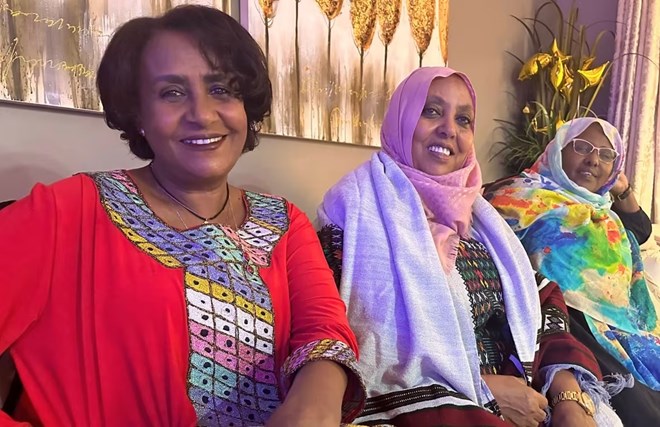
Wednesday February 7, 2024
By Elise Stolte
It might sound like a Ponzi scheme, but it's small and everyone gets the same payout

Hagir Sail plays with her 19-month-old son Sufyan Ahmed in the kitchen of her northeast Calgary home. (Elise Stolte/CBC)
When Hagir Sail found herself facing nearly $2,000 in unpaid traffic fines, she knew exactly how to find the money.
She called six friends, each of them pledged to put $500 a month into a collective savings pot, and as the organizer, she then took the first of six monthly payouts.
It's an example of a saving and credit system that's become common in some cultural communities.
"It's one of these incredible things that solves a problem very quickly for a lot of people," said Sail, who is part of Calgary's Sudanese-Canadian community.
"Within 10 days, I had $3,000."
This is a collective approach to saving, an alternative to credit cards and payday lenders. A first blush, it might sound like a pyramid scheme. But it's different because it's small, everyone in the circle is known, and everyone is getting the same payout.
It can be especially helpful in uncertain times, and goes under many names — uqub in Tigrinya, ayuuto in Somali and chama in Swahili.
Sail goes with the Arabic, thanduk.
They make an agreement, and the collective nature of their community ensures that agreement is honoured.
"We're a very communal society and your societal reputation is everything," said Sail. "If you break the saving circle — you take money and you don't come back — you're never joining a saving circle again, and then trust in the community is zero.
"And we're so lonely here because we don't have family. Your only family is the community members. So if you break that trust, you don't have anybody."
This way of saving came up frequently during CBC Calgary's community project with local East African communities, called Sharing Knowledge.
Studying at Sail's kitchen table, her younger sister Sara said she expects to get in on the tradition when she's a little older. She said she was surprised one day to find out from a Haitian-Canadian friend that this is common in her culture, too.

Sara Sail studies for an exam at her sister's kitchen table. She's a third-year marketing student minoring in entrepreneurship and social innovation. (Elise Stolte/CBC)
Some people use the practice like Sail does, as a specific agreement with a beginning and end. But other times, people join these circles and stay in them for years, getting multiple payouts and building a social network.
Barlin Mohamed has been saving collectively with the same group of women since 1998. She's originally from Somalia, and there are women from Ethiopia in her group as well.
She invited CBC to join them as they gathered for a potluck dinner, to play Ethiopian music videos on YouTube and catch up on each other's lives. The group started when they were new refugees, trying to save enough to send support back home.
"When I started, we put in $100. Whatever we can afford," said Ubah Doli, one of Mohamed's friends. "There were five of us and the money, it's not big. But when you don't have much, it's big. We sent to back home because that time in my country there was war going on. Your family needs you."
As the women found better jobs and settled here, they increased the amount they saved each month. Soon, they were paying for cars, furniture or fridges, and eventually helping their children pay off student loans.
Other women joined over time, but they're careful who they let in, they say.
"There are a few bad apples, bad people. When they come, they take the money and you don't see them again. That happens once in a blue moon," said Doli.

Left to right, Fatouma Ali, Asha Mohamed and Ubah Doli are among half a dozen women who have been participating in a collective savings project for three decades. (Elise Stolte/CBC)
"With this group, if there is new person and we're not sure, we don't give them the first (payout). They get the last," said Fatouma Ali, another woman in the group. "We will tell them the rule is the rule."
Mohamed said she used it to save for a down payment on her house. That was partly because she watched the other women buy houses and followed their example, and also because this offered a systematic way to save. Each time it was her turn to get the payout, she set it aside for the down payment.
It took her six years.
But as the women laugh and share easily in the living room around us, I ask Mohamed: What's more important, the ability to save or the friendship that comes because of this?
"Actually, the friendship," Mohamed said. "Because they are my family. We are a family and friends for many years. We see each other through the good time and the bad time."